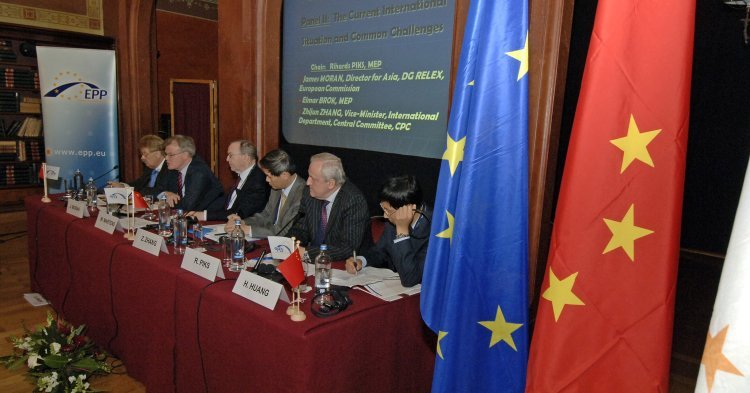Europe needs to stand firm amid economic and geopolitical power shifts
Being aware of their almost 5000 year long history and deeply rooted cultural traditions, the Chinese today are as proud of their past as they are optimistic about their future. This is in part further fueled by president Xi Jinping, who has ruled over the People’s Republic since 2012. Under his reign, something like a “grand strategy”, an overall vision for the country, has emerged. For the year 2049, the 100th anniversary of the People’s Republic of China, the country has set itself ambitious targets to restore the nations’ historical strength and dignity in a variety of aspects. In China, this great rejuvenation is referred to as the “Chinese Dream”. Combined with increasingly nationalistic tendencies, this has resulted in a much more self-confident appearance of the People’s Republic on the world stage. In some instances, it has caused tensions with its neighboring countries or – as has been steadily escalating throughout the last years - conflict with the United States.
The EU finds itself trapped in the crossfire between the old super power and the emerging East Asian powerhouse. If European countries don’t want to get squashed in between the two, then a concerted and unified strategy is urgently necessary. A centralized and unified European Union would be endowed with a lot more bargaining power, and could engage with China much more constructively and on equal footing. This necessity has been particularly visible in three areas.
First, European companies have laid down deep roots in the Chinese market, with the annual turnover of some taking up a huge proportion of their overall turnover worldwide. However, for a few years now, foreign companies have been faced with an increasingly uneven competitive environment and severe regulation. Not a few of their Chinese competitors are heavily subsidized by the government and highly favored when it comes to issuing of public tenders and licensing of products.
Second, Chinese companies are increasingly taking advantage of the openness of the European market. In 2016, Chinese investment in Europe peaked with a total amount of €37,3 billion, with the share of Chinese state-owned enterprises increasing to 72% of total investment in 2017. Investment went mainly into Europe’s high technology areas. Examples being the acquisition of Swedish automobile manufacturer Volvo by the largest Chinese car company Geely or the acquisition of German robotics company KUKA by the Foshan-based Midea Group. Besides economic influence, a study conducted by the two German research institutes Mercator Institute of China Studies and the Global Public Policy Institute shows that Chinese political influence is also growing in Europe, often still below the radar of the public. Government agencies are increasingly fostering cooperation with European media groups, as well as relations with overseas Chinese communities, specifically academic circles. At the same time, Beijing lays out prospects for investment in countries that took up a more critical stance on the EU during the last years. The result is that the European Union often loses ground when it comes to points of conflict with China. In 2017, for example, Greece, a major recipient of Chinese investment that year, successfully blocked a common EU position at the United Nations Human Rights Council on human rights abuses in China.
Finally, as China is pressing ahead with the BRI, its political and economic impact on the global arena is steadily growing. If Europe wants China to be cooperative and devoted to international standards, it needs to speak with one voice. Whether with regards to climate policy or cyber security, the EU has an intrinsic interest in promoting common norms on the world stage. This becomes especially evident in times in which the United States is struggling with domestic instability and declining international involvement under President Donald Trump.
The EU has shown signs of progress, but the future remains uncertain
In all of the three areas mentioned, the European Union has begun to react. At the 21st EU-China summit in April 2019, Chinese representatives promised stronger commitment to guarantee open markets and fair competition, as well as closer cooperation regarding international challenges. To supplement this, the EU has introduced the so-called “Investment Screening Regulation”. This mechanism, which will come into effect in October 2020, will facilitate broader exchange and coordination between EU member-states so as to protect critical industries from state-subsidized foreign investment. And finally, the EU has articulated its own initiative to complement the BRI under the name “EU Strategy on Connecting Europe and Asia”. Though still just an abstract concept, its focus on sustainability and internationally agreed standards in infrastructure investment offers great potential for future global development.
While the EU’s first ever active engagement in geopolitical affairs marks a significant turning point, the effectiveness of these measures still needs to be demonstrated. Either way, the world will continue to change rapidly throughout the 2020s, and China will play a major role in this respect. If Europe wants to stand on its own feet, it has no choice but to overcome its regional disunity. As shown above, some first steps towards a concerted strategy are already taken. But, as the famous author Francis Fukuyama has noted about the EU : “…the ghosts of old national identities continue to hang around like unwanted guests at a dinner party”. The continent is moving, but much more has to be done.

Suivre les commentaires : |
|
